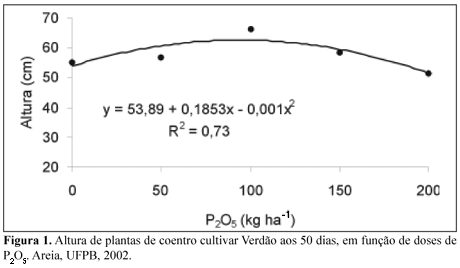Coriander (Coriandrum sativum L.) is an arbustive vegetable utilized as spice in regional foods in North and Northeast Brazil. In the Paraiba State it is cultivated by small farmers and the yield of the crop is low mainly due to not well balanced mineral nutrition fertilization. The work was conducted at the Universidade Federal da Paraíba, in Areia, Brazil, from June to August 2002, to evaluate the effect of levels of P2O5 on the yield of coriander, cv. Verdão. The experimental design was randomized blocks with five treatments (0; 50; 100; 150 and 200 kg ha-1 of P2O5) and four replications. Coriander plants were spaced 25 x 5 cm and sown in plots of 2,0 m². The applications of 93 kg ha-1 and 112 kg ha-1 of P2O5 resulted, in maximum plant height (63 cm) and in the higher production of green mass (51 t ha-1), respectively. The level of 110 kg ha-1 of P2O5 was economically the most efficient and provided a green mass yield of 50,55 t ha-1 with an increase of 15,1 t ha-1.
Coriandrum sativum L.; mineral fertilization; yield



